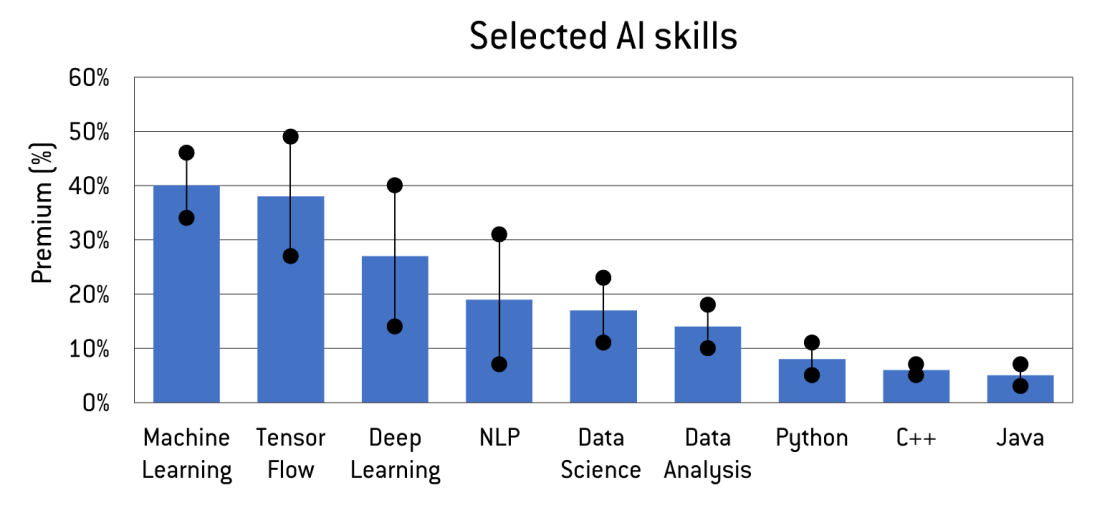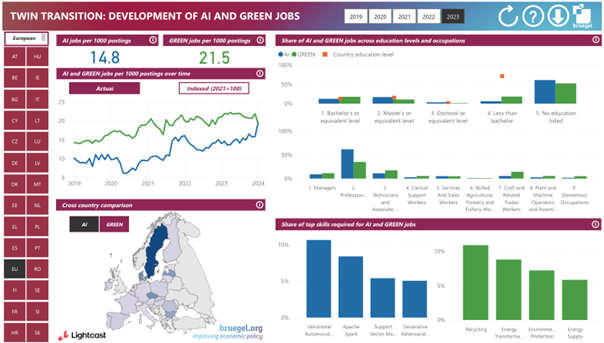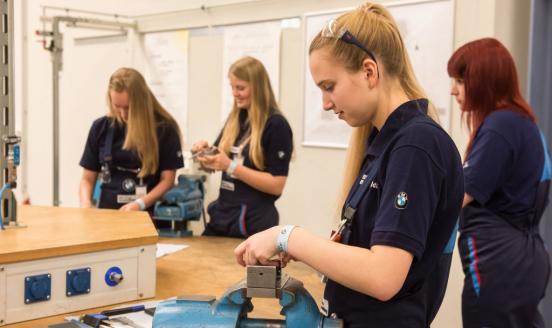Reskilling and mobility: a round-up of project research
As the need for artificial intelligence and green jobs accelerates, there is extraordinary demand for reskilling within the European workforce

The Future of Work and Inclusive Growth project collaboration between Bruegel and the Mastercard Foundation for Inclusive Growth (FWIG) aimed to uncover the evolving dynamics of the labour market, particularly in the context of technological advancements and their impact on the future of work. This summary, spanning articles on the Bruegel blog, analyses, working papers, podcasts and events, provides an overview of the workstream ‘Reskilling and mobility’ and how these concepts are being transformed in the digital age.
Technological transformation and the changing nature of skills
Contrary to the prevalent view that automation will solely lead to job losses, research from the ‘Reskilling and mobility’ workstream indicates that technological progress generates new skill demands.
How the Twin Transition changes the role of skills
As artificial intelligence (AI) and green jobs (sustainability sectors) rapidly progress, they create an extraordinary demand for specialised skills, at times exceeding the supply of qualified workers. The working paper by Eugenia Gonzalez Ehlinger and Fabian Stephany, ‘Skills or a degree? The rise of skills-based hiring for AI and green jobs’ highlights how this skills gap is prompting a shift in employer focus from traditional degrees to specific skill sets during recruitment. The analysis of nearly one million online job postings in the UK from 2019 to 2022, alongside an assessment of the impacts of technological advancements on labour market dynamics, reveals a pronounced trend toward skills-based hiring within AI and green sectors.
This strategy broadens the pool of talent by prioritising practical skills above formal qualifications. Notably, the demand for AI roles has doubled the overall job market growth rate. Simultaneously, the requirement for university degrees in AI roles has decreased by 23%, while the demand for skills in AI job postings has quintupled compared to the average. Statistical analysis also shows that while degrees have diminished in wage value within AI sectors, AI-specific skills now yield a 16% wage premium, rivalling the premium for holding a Ph.D. (17%). Despite this trend in AI positions, the conventional educational premium persists within green job sectors. In light of these findings, the authors of the paper recommend expanding skill development through non-traditional forms of education such as apprenticeships, on-the-job training, massive open online courses (MOOCs), vocational programmes, micro-certificates and online boot camps. These alternatives could provide the workforce with the necessary capabilities to close the skill gaps in rapidly growing fields.
How AI Skills have become extremely valuable
One of those rapidly growing labour market domains are jobs centred around Artificial Intelligence. In their analysis on the economic value of AI skills, Stephany and Teutloff (2024) examine the swift pace of technological and social changes that traditional training systems and employer adaptability can't keep up with, especially in areas such as AI. They analyse the career trajectories of around 25,000 knowledge workers to gauge the value of AI skills. Their research indicates that the significance of a skill largely relies on its complementarity, or how well it augments and integrates with other skills. This principle is vital for several reasons: most positions require a diverse skill set, workers often supplement existing skills with new ones and a versatile skill set provides strategic options for reskilling, bolstering job security amidst market changes.

AI skills are highly valued, offering on average a 21% wage premium due to their broad applicability and their synergy with other high-value skills. This is illustrated in the above figure with a selection of AI skills. The sustained demand for AI skills, coupled with a notable supply-demand imbalance, highlights the critical nature of reskilling and it supports the push for personalised learning paths and flexible certification models. This perspective not only equips workers and companies to manoeuvre through the changing employment landscape but also underlines the strategic importance of investing in AI capabilities to boost productivity and counteract the impacts of technological shifts.
Skills shortage in the EU's transition towards electric vehicles
Similar to the advance of AI, the labour market witnesses a tremendous growth for more ecologically friendly products and services. The working paper by Conor McCaffrey and Niclas Poitiers delves into the challenges and strategies associated with the transition from internal combustion engine vehicles to electric vehicles in the European Union. They specifically focus on the European Battery Alliance Academy's role in mitigating the skilled labour shortage caused by this transition. This shift demands a profound transformation in the required skills within the automotive industry, leading to significant difficulties in sourcing adequately trained workers. Surveys cited in the paper indicate that the scarcity of skilled labour is perceived by firms as a critical issue, comparable in magnitude to high energy costs, thereby posing a substantial hurdle for the development of a European battery industry amidst a general skills shortage in the EU.
Among the explicit findings, the paper notes the acute skills gap in the lithium-ion battery sector, which is integral for powering electric vehicles and a key component of the automotive industry — a sector accounting for a significant portion of manufacturing employment in the EU. The paper underscores the discrepancy between the EU's ambitious industrial policy shifts, exemplified by initiatives like the European Chips Act and the proposed EU Net Zero Industry Act, and the relatively underdeveloped measures to enhance workforce skills in alignment with these shifts. McCaffrey and Poitiers' work sheds light on the intricate interplay between industrial policy, labour market dynamics and the skilled labour shortage. It advocates for a more nuanced and integrated approach to labour market and industrial policies within the EU, emphasising the critical role of skilled labour in realising the transition to a sustainable automotive industry and the broader green economy.
Skills for a more resilient workforce
As the demand for skilled professionals in AI outstrips supply, both companies and workers are challenged to keep pace with the required expertise. This dilemma was at the forefront of the ‘Up and ahead: skills for a more resilient EU workforce’ event in January 2023, which convened leading experts in employment and reskilling. The event underscored the irony of the widespread recognition of lifelong learning's value, juxtaposed against the reluctance to engage in ongoing training. It underlined the importance of career guidance, the need for greater employer engagement in reskilling efforts while enhancing the image of Vocational Education and Training (VET) to address skill gaps and unemployment.
Discussions at the event also focused on the unique hurdles faced by young workers, including high unemployment and the tricky shift from education to the workforce. The consensus was clear: more programmes are needed to seamlessly connect education to the demands of the job market, especially in STEM and manufacturing. The conversation also advocated for boosting STEM engagement among women by dispelling gender biases and providing strong female role models.
The value of paid apprenticeships was stressed, recognising that any value-adding work deserves fair compensation and that employers should facilitate upskilling to boost productivity. The event concluded with a call to foster a culture that prizes ongoing education and training, highlighting that benefits such as salary progression can incentivise greater commitment to lifelong learning.
Overcoming barriers to training and re-skilling
Bridging the skills gap for lifelong learning and labour market needs
Identifying and addressing the barriers to learning new skills is essential, as Duygu Güner and Laura Nurski pointed out in their examination of the European Union's training challenges. They reveal a disconnect between the skills available in the labour market and those sought by employers – approximately 40% of workers need to acquire new skills due to evolving job requirements. Despite the clear demand for training, participation in the EU lags, further entrenching socio-economic disparities.
The primary hurdles include time and financial constraints, hitting disadvantaged workers hardest. For the low-educated, additional barriers like limited internet access, past negative educational experiences and unmet prerequisites for training can impede progress. Moreover, significant health issues, often correlated with lower income, further prevent these individuals from pursuing training opportunities.
The lack of enthusiasm for training among the low-educated stands in stark contrast to the pressing need perceived by employers for workforce upskilling. Güner and Nurski argue for interventions tailored to individual circumstances and for tackling the psychological and social impediments to training participation, which are vital to fostering a culture of lifelong learning.
Laura Nurski further explores this in the article ‘Beyond the training gap: learning foundational skills for the digital age’, stressing the importance of foundational digital skills across all job sectors. Online job ad analysis shows a high demand for not only technical but also cognitive, interpersonal and self-management skills, suggesting a critical need for educational reform and targeted reskilling. However, those most in need of adult training - such as the unemployed, low-skilled workers and older individuals - are the least likely to participate, highlighting a troubling gap.
She emphasises that formal training is not the sole path to skill acquisition; informal on-the-job learning can be equally effective. Yet, such opportunities are scarce for disadvantaged workers in roles that often offer limited developmental prospects. This disparity is linked to job design and organisational structure, with higher-level positions typically providing more chances to develop foundational skills.
Examining France's individual learning accounts and their impact on STEM skills development
One successful showcase on how to help workers and firms explore new learning opportunities is via so-called individual learning accounts. In their analysis ‘Promoting STEM skills: a brief assessment of French individual learning accounts’, authors Duygu Güner and Kamil Sekut delve into the effectiveness of French Individual Learning Accounts (ILAs) in fostering essential skills for the modern workforce. The study focuses on the Compte Personnel de Formation (CPF), a pioneering ILA scheme in France, highlighting its role in promoting basic digital skills crucial for adapting to the evolving demands of digital and green technologies. The European Union's endorsement of ILAs underscores their potential in lifelong learning initiatives, aiming to bridge skill gaps and address gender imbalances in STEM fields.
Güner and Sekut's assessment reveals that while CPF has successfully enhanced basic digital competencies, it falls short in advancing more complex skills such as programming and artificial intelligence. Additionally, the analysis points out a significant gender disparity in specialised STEM training courses under CPF, mirroring broader educational trends. Despite these challenges, the authors recognise ILAs as valuable tools for personal and professional development, providing a flexible framework for individuals to acquire and update their skills. The findings suggest the need for targeted policies to expand the range of training opportunities offered through ILAs and to promote gender equality in STEM education and careers. By addressing these issues, ILAs like CPF can more effectively align with strategic priorities and meet the labour market's evolving needs.
Leveraging data for skills insights
Online generated data: a resource for looking into the future of work?
In several contemporary reskilling and learning strategies, data has become a resource of pivotal importance. In the article on the Bruegel blog titled ‘Using online data to glimpse into the future of work’, Fabian Stephany explores how data from online sources can bridge the skill gap in the labour market by identifying emerging occupations and the demand for specific skills. He points out the growing discrepancy between the skills available in the labour market and those demanded by employers, exacerbated by rapid technological changes that favour new skills and render others obsolete. He underscores that traditional training programmes are increasingly unable to keep pace with these changes, leading workers to take more personal responsibility for their reskilling through online courses and other digital means.
The work highlights the value of data from online labour platforms, job vacancy portals and professional social networks like LinkedIn, which can inform skill development strategies and predict new occupational domains. This data can provide insights into skill compositions and requirements, although it often lacks information on wage levels and market demand-supply dynamics. The European Commission's initiatives, like the Pact for Skills and proposals for individual learning accounts and micro-credentials, aim to utilise such data to make skill needs explicit and acknowledge workers' unique training histories.
By leveraging online-generated data, policymakers and educators can offer more targeted and timely reskilling advice, aligning workforce capabilities with the evolving demands of the digital economy. This approach facilitates more informed decision-making in reskilling efforts, ensuring that training programmes are aligned with current and future labour market needs.
Tracking the Twin Transition with a novel dashboard
As a showcase for the insightful capacities of online-generated data, Giulia Gotti, Duygu Düner and Fabian Stephany developed the Twin Transition dashboard - an interactive online tool tailored for researchers, journalists, and policymakers, offering real-time insights into the evolving landscape of employment opportunities in AI and green jobs across Europe. The Twin Transition dashboard sheds light on the trends and makeup of demand for AI and environmental skills, offering a deep dive into the shifting job market in AI and eco-friendly sectors across Europe. Additionally, the dashboard presents an overview of the necessary educational backgrounds, emerging skills and trends in growth. It specifically highlights roles in AI, including ChatGPT and natural language processing and explores opportunities in eco-conscious sectors like renewable energy, environmental protection and waste management.

The Sound of Economics podcast
The above-mentioned discussions on the role of skills and learning are further expanded upon in the project’s Sound of Economics podcast series. The Skills podcast series explores the future of work through various lenses, inviting experts from the fields of research and policy to share their views on each topic. Joined by Dimitrios Pikios, ESCO Project coordinator at DG Employment, Social Affairs and Inclusion at European Commission, ‘The Skills of the Future’ podcast episode delves into the implications of technological advancements on the labour market, highlighting the need for policies that support labour-complementing technology and worker adaptation through reskilling.
‘Skills-shift: Navigating the Future of Work’ addresses the challenges posed by digitalisation and automation, advocating for upskilling and reskilling to maintain a resilient workforce in the face of job displacement with El Iza Mohamedou, the Head of the OECD Centre for Skills. And in ‘Skills-based Hiring: Tackling the Labour Shortages’, Bruegel’s experts discuss the concept of skills-based hiring to mitigate skill mismatches and shortages with Mona Mourshed, the CEO of the reskilling NGO Generation, emphasising the organisation’s role in enhancing labour market efficiency and supporting digital transformation.
Additionally, another episode of the Skills podcast series features discussions with civil society representatives Raffaela Kihrer, the Deputy Secretary General and Head of Policy of the European Association for the Education of Adults and Sertaç Yerlikaya, the country manager of 42 İstanbul, a coding school in Türkiye, Director of Türkiye Open Source Platform and Country Coordinator for the World Economic Forum's "Closing the Skills Gap Accelerator". In this episode, they talk about the critical role of civil sector partnerships for skills development. They emphasise the importance of civil society's engagement in these partnerships and its advocacy in bridging the skills gap.
In the final instalment of The Skills podcast series, Rebecca Christie engages in a dialogue with Duygu Güner and Francesca Rosso, Human Capital Development Expert at the European Training Foundation, on the emerging trends in skills anticipation and its effects on educational and vocational training systems. The conversation centres on equipping the workforce with the necessary skills for the green transition and ensuring a seamless upskilling process for all workers.
The ‘Reskilling and mobility’ workstream of the FWIG project highlights a pivotal shift in labour market needs in times of technological change. The research gathered during the project underlines the growing relevance of STEM and AI skills, favouring specific skills over traditional degrees. It reveals some of the barriers to learning in the EU but also providing promising examples on how lifelong learning and new data sources can help to foster sustainable reskilling.



